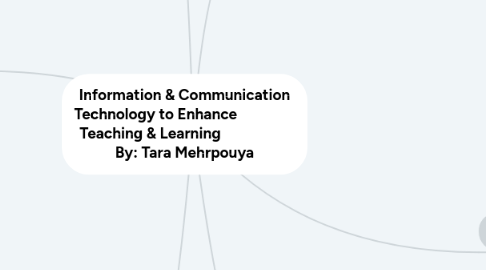
1. Challenges
1.1. Lack of network infrastructure
1.2. Slow & unstable wireless access
1.3. Cost of technology and its maintanence
1.4. Teacher & Staff education
1.5. Digital Divide
1.5.1. The gap between the privilege and underprivileged members of society in terms of their ability to access digital tools and the Internet
2. Benefits
2.1. Digital communications are an important aspect of improving school communication. Teachers use technology to develop blogs, newsletters, or use social media tools such as Facebook or Twitter to keep parents involved and informed of their child's school day.
2.2. Students and teachers have access to a variety of App's and free resources that provide services which are beyond the traditional textbooks
2.3. Students learn beyond the school walls as they can acquire education through the internet (like we are)
3. Recommendations (Based on Article)
3.1. Develop a working definition of digital literacy: technology is not a prerequisite to effective teaching, however, digital literacy is a prerequisite for students' participation in adult life
3.2. Establish a framework for evaluation of quality and value of ICT investments: working with boards and the Ministry should develop a clear public process to assess the quality and value of technology products being purchased and used by schools
3.3. Support teachers' digital professional development: ongoing need for high quality professional development to help teachers, particularly those who are not 'digital natives'
3.4. Bridge the Digital Divide: additional research is required to ensure that schools' efforts to ensure that technology is being used in a inclusive way
3.5. Develop policy to ensure quality learning resources: free online materials by teachers in schools requires active policy work to ensure students have access to materials that support the curriculum
4. SAMR MODEL for Teaching
4.1. Redefinition
4.1.1. Technology allows for the creation of new tasks
4.2. Modification
4.2.1. Technology allows for significant task to be redesigned
4.3. Augmentation
4.3.1. Technology acts as a direct tool substitute, with functional improvement
4.4. Substitution
4.4.1. Technology acts as a direct tool substitute, with no functional change
5. Access
5.1. Information & communication technologies is increasingly important to effectively participate in the economic, political & social aspect of the so-called knowledge society.
5.2. In Ontario elementary schools, the most common place for students to access technology today is their own classrooms, followed by libraries, computer labs, and in a majority of schools, students' own devices
6. TPAK Model
6.1. Technological Pedagogical Content Knowledge, is a model that helps teachers consider how their knowledge domains intersect in order to effectively teach and engage students with technology. What teachers know, how they teach, and the role of technology to better impact student learning.
6.1.1. Content Knowledge is the WHAT - The educator's knowledge of the subject area (Math, Science, Language)
6.1.1.1. Pedagogical Content Knowledge brings about learning that is built upon strong subject knowledge and teaching and learning strategies
6.1.1.2. Technological Content Knowledge is to bring about learning that is built upon strong subject knowledge and a mastery of more than the subject that is taught
6.1.2. Pedagogical Knowledge is the How - The methods of teaching and assessment like project based learning or instructional strategies
6.1.2.1. Technological Pedagogical Knowledge is an understanding of how teaching and learning can change when particular technologies are used in particular ways
6.1.3. Technological Knowledge is the knowledge of the tools on how to select and use to integrate it into the curriculum
6.1.3.1. Technological Pedagogical Content Knowledge is meaningful teaching with or without technology. It differs from the three individual concepts because to embrace all three simultaneously requires a deep understanding of how all three can work together to bring about best technology and pedagogically sound learning based upon a deep understanding of the subject.

